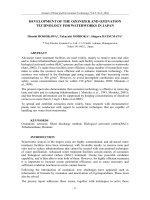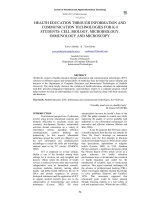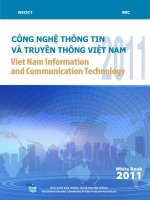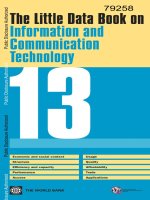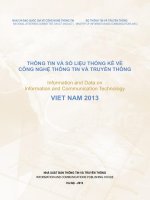Information and communication technology for social development an international symposium jakarta 22 24 may 2006
Bạn đang xem bản rút gọn của tài liệu. Xem và tải ngay bản đầy đủ của tài liệu tại đây (699.64 KB, 61 trang )
Informationand
CommunicationTechnology
forSocialDevelopment
AnInternationalSymposium
Jakarta,22‐24/May2006
EditedbyJonBaggaley
Acollaborationbetweenthe
ICT4D/ASEANCollaboratoryand
thePANAsiaNetworkinginitiativeon
DistanceLearningTechnologies
(PANdora)
TheICT4D/ASEANand
PANdoraprojects
aresupportedbyCanada’s
InternationalDevelopment
ResearchCentre(IDRC)
Jakarta:ASEANFoundation(June2006)
______________________________________________________
Foreword
THEMINISTRYOFRESEARCHANDTECHNOLOGY
REPUBLICOFINDONESIA
OpeningspeechbyHEKusmayantoKadiman
MinisterofResearchandTechnology
attheInternationalSymposiumon
ICTforSocialDevelopment
Jakarta,23
rd
May2006
DistinguishedLadiesandGentlemen,
Firstofall,letmeexpressmyhighestappreciationtotheASEAN
Foundation(AF)andtheInternationalDevelopmentResearch
Center(IDRC)ofCanadafortheirinitiativeandeffortsin
implementingtheICT4Dcollaborationprojectthatiscurrently
resumingits3
rd
yearprogram.Ibelievethatalloftheoutcomeswill
helptheregioninunderstandingbetterandfindingmorenew
waystosolveissuesrelatedtothedevelopmentofinformationand
communicationtechnology(ICT)intheSoutheastAsiaregion.
ThereforeIwouldliketoaskthatallofthematerials,
experience
and“lessonslearned”canbesharedwidelyamongtheinstitutions
oftheparticipatingcountriesandalsootherregionsthatneedour
helpinsolvingtheirICTissues.
Asweareallaware,thedigitaldivideisnotonlyaworld‐wide
issue,butisalsoanissuethatcannot
besolvedinonedayand
needsalong‐term,consistentandsystematiceffortthroughmany
stages.Thatiswhythedigitaldivideissueisaddressedinmany
regionsasacommonworldproblem,tomakesurethatno‐oneis
leftbehindinthetransformationtowardsthedigitalculture.
iii
Thisdigitalgapisnotasimplegap,however.Itcanresultfroma
lackofawarenessorapplication,infrastructureoraccess,education
andwealth,orsimplyfromadifferentlifestyleorculture.Itisour
responsibilitytoreallyunderstandthenatureofthisgapinthe
region,and
tofindwaystonarrowit.Inthiscontext,itisvery
importantthatwedistinguishbetweentwodifferenttypeof
promotingICT,firstlytheefforttoincreaseournational
competitivenessbyusingICTsin,forexample,e‐government
initiativestoincreaseefficiency;andsecondlyintheefforttohelp
communities
inruralareas(theothersideofthegap)tomakesure
theywillnotbeleftbehind.
Asaruleofthumb,tonarrowthedigitalgap,weneedtofindways
forthedevelopmentofthesecondgrouptohavefasteracceleration
thanthatofthefirstgroup.
Communitiesinruralareasnormally
haveaminimalknowledgeofICTandfacedifferentlifeproblems.
Indevelopingcountries,theycommonlyfaceverybasichuman
problemssuchaslackoffood,andeducation.Itistherefore
importantforustointroduceICTsinruralareasthatfittotheir
common
lifepriorities,sothattheyreallycancatchupand
systematicallybuildtheirregiontowardsafuturedigitallifestyle.
Permitmetohighlightsomeexamples.Inseekingtoeradicate
povertyandhunger,wecanuseICTtoincreaseaccesstomarket
informationandreducetransactioncostsforpoorfarmersand
traders.InimprovinguniversalprimaryeducationwecanuseICT
toincreasethesupplyofmaterialsandlecturesthroughdistance
learningprograms.Theseexamplesshowusthatthedigitaldivide
issue,especiallyinrelationtosocialproblems,needstobe
formulatedcarefullysothatitwillreallyfittheneedof
thelocal
community.Iwouldliketosuggestthatthiscollaborationcanbe
extendedtoamorelong‐termbasiswithanobjectivetounderstand
infullthenatureofsocialdevelopmentintheregion,andtoassist
thepeoplefromstagetostage,innarrowingthegapbetweenthem
andthefuturedigitallifestyle.Ibelievethatlong‐term
collaborationswillenableustofindoptimalapproachesthatcanbe
sharedwiththerestoftheworld.
Anotherexampleisthenationaldisasterissue.DuringtheTsunami
disasterinAceh,Indonesiaexperiencedthelossofallpublic
informationin
theregion,aswellasthetelecommunication
infrastructure.Anewemergencywirelessnetworkhassincebeen
iv
implementedtorebuildAceh’sinfrastructure,especiallyinsupport
ofpublicserviceactivities.Thisexpensivelessonhastriggeredusto
givemoreattentiontoourgeographicalparameters,andtomake
useofICTnetworks
tosupportdisasterearlywarningsystems.
Indonesia’scurrentfocusinthefieldofICTistodevelopthe
infrastructure,includingtelecommunications,internetand
computersaccessibletoIndonesia’swidespreadcommunities.The
useofICTisexpectedtobecomethe‘enabler’ofeconomicgrowth
andthetriggerof‘GoodCorporateGovernance”’as
wellasan
importanttooltodevelopdemocracyinIndonesia.
OneofourcurrentprogramsistheIndonesia,GoOpenSource(IGOS)
initiative,initiatedbyfiveMinistries:ResearchandTechnology,
CommunicationandInformation,LawandHumanRights,
EmpowermentofHumanResources,andNationalEducation.This
initiativeiswidelypromotedby
thegovernmentasatoolto
minimisethe“quitehigh”softwarepiracyrate,byintroducingan
opensoftwareapproachasanalternativeforthecommunity.This
initiativeisalsobeingdiscussedintheASEANregion,inorderto
createawiderregionalsupportaswellastostrengthenthelocal
and
regionalsoftwareindustries.
TheconvergenceofICTnetworksisalsoanimportantissuethat
needstobeaddressedthroughouttheregion.Ibelievethatthe
convergencetowardsIP‐basedwirelessnetworkswillgiveusthe
opportunitytonarrowthedigitalgapbybuildingtheICT
infrastructureinruralareasat
amuchcheaperandfasterrate.The
MinistryofResearchandTechnologyiscurrentlyinitiatinga
numberofstudiesandresearchactivitiesonICTconvergence,to
identifyallofthenear‐futureoptionsfornarrowingthedigitalgap,
especiallyforsmallandmediumenterprises(SMEs)and
communitiesinruralareas.
Again,letmeexpressmyhighestappreciationtotheASEAN
FoundationandtheInternationalDevelopmentResearchCentre,
andtoallpartiesfortheirinitiativeandcontribution,includingthe
organisingcommitteeofthissymposium.Ihopethatallofthe
knowledge,experienceandlessonslearnedcanbewidelyshared,
andI
hopethatthiscollaborationcanbestrengthenedinthefuture
forthebenefitofthecommunitiesintheregion.Thankyou.
KusmayantoKadiman,StateMinisterofResearchandTechnology,
Jakarta,May23,2006.
TableofContents
Page
iii Foreword(HEKusmayantoKadiman,StateMinisterof
Research&Technology,RepublicofIndonesia)
1 Introduction(ApichaiSunchindah,ExecutiveDirector,
ASEANFoundation)
5 1)ResearchingandEvaluatingICTforSocial
Development(ColinLatchem)
21 2)BuildingCollaborativeOpen&DistanceLearning
Research
(JonBaggaley,TianBelawati&
NaveedMalik)
29 3)BestPracticesforCapacity‐BuildinginCambodian
DistanceEducation(DoungVuth,CheaSokHuor&
ChhuonChanThan)
39 4)EvaluationNeedsofMedicalDistanceEducationin
Mongolia(D.Amarsaikhan&S.Oyun)
45 5)UsingOpen‐SourceSoftwareforOpenand
DistanceLearning(BatpurevBatchuluun)
55 6)InnovativeICTsintheASEANRegion
(FelixLibrero)
69 7)ViabilityofSMSTechnologiesforNon‐Formal
DistanceEducation(AngeloRamos)
81 8)UsingSMSMethodstoCombatAvian‘Flu
(BambangWijayanto)
93 9)InstructionalDesignTrainingforICT‐Based
DistanceLearning
inAsia(FelixLibrero)
9910)Summary:EstablishingaCollaboratoryasan
InfrastructureforInternationalICTResearch
(JonBaggaley&EddyBahfen)
111 ListofSymposiumDelegates
Introduction
IntroductionbyApichaiSunchindah
ExecutiveDirectoroftheASEANFoundation
attheInternationalSymposiumon
ICTforSocialDevelopment
Jakarta,23
rd
May2006
Dr.Ir.RichardMengko,Minister’sAdvisorforInformation
TechnologyAffairsoftheStateMinisterofResearchand
TechnologyoftheRepublicofIndonesia;Excellencies;
DistinguishedGuests;LadiesandGentlemen,
Averygoodmorningtoeverybody,andawarmwelcometo
Jakartaforthoseofyoucomingfrom
abroad.Onbehalfofthe
ASEANFoundation,itismygreatpleasuretowelcomethe
distinguishedguests,speakersandparticipantstothisOpening
CeremonyofanInternationalSymposiumonInformationand
CommunicationTechnology(ICT)forSocialDevelopment.
Firstofall,Iwouldliketoexpressmysinceregratitudeto
Minister’sAdvisorfortakingthetimetobewithusthismorning,
reflectinghiskeeninterestandfirmsupportforresearchand
developmentinscienceandtechnologyactivitiesintheregion.I
wouldalsoliketoconveymygratefulappreciationtothe
InternationalDevelopmentResearchCentreofCanada(IDRC)for
its
financialsupporttotheFoundationthroughtheICT4D
Collaboratoryprojectoverthepastthreeyears,andinthe
organisationofthissymposium.
TheAssociationofSoutheastAsianNations(ASEAN)wasfounded
in1967topromotecooperationineconomic,scientific,socialand
culturalfields,aswellasothertransnationalissuesof
common
concern.Amongitsmainpurposesistohasteneconomicgrowth,
socialprogressandculturaldevelopmentinSoutheastAsia,sothat
theregionwillbemoredeveloped,prosperousandpeaceful.By
2
workingtogether,ASEANcountrieshopetoimprovetheliving
standardsofthepeoplesoftheregion,andtoincreaseawarenessof
theircommonhistory,legacyanddestiny.Toallintentsand
purposes,ASEANasawholeattachesgreatimportancetohuman
resourcesandsocialdevelopment.AllsectorsofASEAN
have
recognisedthesignificanceofthedevelopmentoftheregion’s
humanresourcesforitsfuturegrowthandsuccessinan
increasinglycompetitiveworld.
ItisforthisparticularreasonthattheASEANFoundationwas
establishedbytheASEANHeadsofGovernmentson15December
1997,duringtheAssociation’s30
th
anniversaryCommemorative
SummitinKualaLumpur,Malaysia.TheFoundationaimstohelp
bringaboutsharedprosperityandasustainablefutureforthe
peoplesofalltenASEANcountries.ThesenowincludeBrunei
Darussalam,Cambodia,Indonesia,Laos,Malaysia,Myanmar,the
Philippines,Singapore,ThailandandVietNam.Iamgladtosee
thattheparticipantsatthisSymposiumarefromthroughoutthe
ASEANregion
TheASEANFoundationhasbeenmandatedtopromotegreater
awarenessofASEAN,andgreaterinteractionamongitspeoples
andtheirincreasedparticipationinASEANactivities,aswellasto
undertakedevelopmentcooperationactivitiesthatenhancemutual
assistance,address
equitableeconomicdevelopment,andreduce
poverty.Overtheyears,theASEANFoundationhascontributedto
developingtheASEANsocio‐culturalcommunitythroughvarious
humanresourcesdevelopmentprojects,informationdissemination
campaigns,networkbuilding,andcommunityresource
mobilisationactivities,cuttingacrossfourmajorsectoralareas:
1. Socialdevelopment(withspecialfocusonchildrenandyouth,
women,ruraldevelopment,agriculture,disastermanagement,
education,healthandnutrition);
2. ScienceandTechnology;
3. Environment;and
4. Cultureandinformation.
Inthepastsevenyears,theFoundationhasfundednearly100
projectsintheseareas,tothetuneofapproximately15million
USdollars.Ithasbeenquiteapparentthatoneofthegrowing
concernsfortheSoutheastAsiaregionistonarrowthedigital
dividewithinandamongASEANcountries.
Onewayof
overcomingthisproblemistoincreasedigitalopportunitiesfor
3
ASEANpeople.Wearealsoawarethatmanyofthedevelopments
intheapplicationofICTforsocialpurposesaretakingplacein
Asia.Inthisregard,oneofthepriorityareasoftheASEAN
Foundationis
onpromotingaccesstoICTresourcesfordifferently
advantagedgroupsincludingyouth,women,personswith
disabilities,andruralcommunities.
OvertheyearstherehavebeenanumberofICT‐relatedprojectsin
ASEANcountries,fundedbytheFoundationwiththesupport
fromvariousdonors.Inparticular,theInternationalDevelopment
Research
CentreofCanada(IDRC)hasfundedaprojectknownas
theICTforDevelopmentCollaboratory(ICT4D),whichhas
providedawiderangeofICTservicestothecitizensofASEAN
sinceitsestablishmentherein2003.Thissymposiumisintendedto
marktheculminationofthe3‐yearphaseoftheCollaboratory’s
service,andtoshowcasetheactivitiesundertakenandthe
achievementsmade.TheSymposiumisalsointendedtoserveasa
forumforreviewingtheCollaboratory’sexistingprojectsandthe
developmentoffutureinitiatives.TheFoundationwouldnothave
beenabletoorganisetheSymposiumwithoutthegeneroussupport
of
theIDRC,forwhichIwouldliketoonceagainexpressmy
sincereappreciation.Iwouldliketoparticularlythankallthe
speakers,aswellastheparticipantswhohavecomeandsupported
thiseventandwhowillsurelyprovidesignificantcontributionsto
thesuccessoftheSymposiuminthenexttwodays.
ItrustthattheresultsoftheSymposiumwillserveasavaluable
contributiontothedevelopmentandprogressofICTinASEAN
countriesandbeyond,throughthebuildingofvariousnetworks
andpartnershipsforfuturecollaboration.Itisagreatpleasurefor
metoaddressyouthis
morningasweembarkontheSymposium,
whichwillhopefullystrengthenthecapacityofpeoplesinthis
regionandincreasetheirawarenessofeachother.Withthis,Iwish
eachandeveryoneofyouaproductivetwo‐daysession,andI
hopeyourstayherewillbeanenjoyableone.
Thankyouforyourkindattention.
ApichaiSunchindah,
ExecutiveDirector,ASEANFoundation,
Jakarta,May23,2006.
Chapter1
ResearchingandEvaluatingInformation&
CommunicationTechnologyforSocialDevelopment
ColinLatchem
Introduction
Projectsapplyinginformationandcommunicationtechnology
(ICT)tosocialdevelopmentarerarelyresearched,evaluatedor
reported,andevenwhentheyare,theconceptualisation,design,
conductandreportingofthisworkoftenlacksquality.Thereisa
needforfarmorerigorousresearchintoICTprojectsatthe
national,organisational
andpractitionerlevels,toachieveabodyof
researchthatcanguidefutureplanningandpractice.Policy‐
makers,plannersandpractitionersalikeneedtobeinvolvedin
undertakingformativeandsummativeevaluation,andquantitative
and/orqualitativeresearch,notonlytoimprovetheirown
knowledgeandskillsinICTforsocial
development,buttoprovide
robustandstrategicallysignificantfindingsthatcaninfluenceand
guidegovernments,donors,andotherkeystakeholders.
ResearchandevaluationofICTforsocialdevelopmentareneeded
atthe:
1) Nationallevel:
• toenablegovernments,nationalagenciesandotherkey
decision‐makerstoassessthequality,cost,relevance,
effectivenessandpotentialofICTprojects;and
• toinformpolicy‐making,managementandimplementation
insuchprojects.
_______________________
ProfessorColinLatchemisanopenanddistancelearningconsultant,
formerlyofCurtin
University,Perth,Australia.
6
2) Organisationallevel
:
• toensurethatsocialdevelopmentneedsareunderstoodand
providedfor;
• tosatisfytheinternalandexternalreportingrequirements
andassurequalityinprocessesandoutcomes;and
• toensurethatthoseengagedintheprojectsaregrantedthe
status,trainingandresourcestheyneed.
3) Practitionerlevel
:
• toimprovetheunderstandingandpracticeofthemanagers,
courseandmaterialsdevelopers,teachers,trainersand
technologists;and
• topersuadeotherstosupportsuchprojects.
ICTforsocialdevelopmentneedstobeinformedby:
• empiricalinquiry,throughwhichprojectsareanalysedtoguidefuture
practice;
• theoreticalinquiry,inwhichhypothesesandconceptualframeworks
aredevelopedtoguidefuturethinkingandaction;
• formativeresearch,whichisconductedthroughoutprojectstomonitor
whatisoccurringsothatcorrectionsandrevisionscanbemadebefore
itistoolate;
• summativeresearch,whichiscarriedoutattheconclusionofprojects
tomeasuretheoutcomesagainstthemissions,goalsandkey
performanceindi cators,andtoreportonwhatsucceededandwhat
failed,andwhy;
• quantitativeresearch,whichinvolvescollectingnumericaldata
throughsurveysand
questionnairestoinformtheplanning,
implementationandreviewofprojects;and
• qualitativeresearch,whichinvolvesobserving,questioningand
documentingprocesses,actions,behaviours,opinions,andvalues,to
informtheplanning,implementationandreviewofprojects.
Orbyanycombinationofthese.
LetusconsiderthekindsofresearchneededinICTforsocial
development.LetussupposewearedevisingaprojectusingICTto
helpfarmersinremote/ruralareasimprovetheirfarmingmethods.
Beforeembarkingonthisproject,weneedtoknowwhothese
farmersare,wheretheyare,whattheirneedsare,theirlevelsof
literacy,theircircumstancesandculture,thetechnologiestheycan
access,affordanduse,andthetrainingmethodsthataremost
7
likelytoworkwellforthem.Thisworkisformative.Aswedevelop
anddeliverthe
ICTapplications,weneedconstantlymonitoringof
theprocessesandoutcomes,toseewhethertheyareworkingor
needchanging.Thisresearchisalsoformative.Attheconclusionof
thisproject,weneedtoknowandreportontheoutcomes,the
numbersoffarmerswhotookpart,thedropoutrateanditscauses,
thecosts,costbenefitsandcostsavings,theeffectivenessofthe
technology,anyproblemsthatarose,andanyfurtherworkthatis
needed.Thisissummativeresearch.
Someofourresearchwillbequantitative.Weneedtofindoutwhat
percentageofthetargetedgroupoffarmers
signedupforthe
project,whatpercentagestayedthecourse,whatpercentagecould
accessthetechnology,whatpercentagecouldoperatethe
technology,whatpercentagefoundtheICTinformationand
traininguseful,andsoon.Someofourresearchwillbequalitative.
Forexample,weneedtoknowwhatthefarmers
thoughtofthe
project,whattheylikedanddislikedaboutit,whattheyfound
mostuseful,whethertheyputthenewideasintopracticeand
whethertheyworkedwell,andwhethertheywouldtakepartin
furtherprojects.
Alloftheaboveisempiricalinquiry.Ifweengagedintheoretical
inquiry,wewouldtrytoworkoutwhattheoryormodelcouldbe
appliedtotrainingfarmersviaICT,orwhatcultural,psychological
andotherfactorsneededtobeembeddedinthisframework.Some
ofthisworkcouldbeintheformofindependentor‘third‐party
research’,carried
outbyoutsideexpertswhohavenothingtogain
orlosefromtheirstudies.Suchresearchisstrictlyobjective,usually
‘once‐off’,andprimarilyconcernedwithprovidingfeedbackto
governments,donorsandotherprovidersonprojects’quality,
impactandvalueformoney.
Someofthisworkmaybeinthe
formof‘practitionerresearch’
undertakenbymanagers,teachersortrainers,instructional
designers,ICTexperts,andothersinvolvedintheproject,inorder
toassessandimprovetheirprofessionalpractice,testnewideas,
methodsandmaterials,sharefeedbackwithcolleaguesanddecide
whichnewapproachestocarryforward.Byitsvery
nature,
practitionerresearchiscyclical.AsWoodley(2004)pointsout,the
meaningof‘research’is“tosearchandsearchagain”.Situationsare
continuallychanging,therearealwaysnewdepthsand
complexitiestofathom,andnewknowledgeisforeverthrowing
8
newlightonourassumptionsandpractices.Sothereisalways
needforfurtherresearchtosupport,extend,challengeordisprove
ourthinkingandpractices.
AcriticalreviewofODLandICTresearchandevaluation
Muchoftheresearchintoopenanddistancelearning(ODL)and
ICTcomes
inforcriticism.TheformerVice‐ChancelloroftheUK
OpenUniversityandPresidentoftheCommonwealthofLearning,
SirJohnDanielrefers(2002)tothemassoftrivialandbadly
conceivedresearchthathasspawned,asODLhasbecome
fashionableinconventionalinstitutions.ProfessorDianna
Laurillard,headoftheUK
government’se‐learningstrategyunit,
observed(1994)thatmanyevaluativestudiesofICTare
persistentlyandpredictablyinconclusivebecausetheyignorethe
manycomplexfactorsthatcansupportorunderminetheiruse.
Phipps&Merisotis(1999)referredtothepaucityoforiginal
researchdedicatedtoexplainingorpredictingphenomenarelated
toODL,andobservedthatlittleofthisworkallowsforextraneous
variablesorevidencescauseandeffect.Forexample,manystudies
suggestthatODLcoursescomparefavourablywithclassroom
learning,butthequalityofmuchoftheresearchisquestionable,so
thefindingsareinconclusive.Naidu(2003),Passi&Mishra
(2003)
andRobinson&Creed(2004)havesuggestedthatmuchODL/ICT
researchisreiterative,usesinvalidandunreliableinstruments,and
yieldslittleinthewayofnewinformation.
Reviewingthe374editorials,articlesandcolloquiapublishedinthe
31issuesoftheBritishJournalofEducationalTechnology(BJET)
betweenJanuary
2000andNovember2005,Latchem(2006)found
thatover50%ofthemaddressedissuesintheuniversitysector,
thatveryfewexaminedODL/ICTinopenschoolingortechnical
andvocationaleducationandtraining(TVET),thatnoneexamined
ICTforsocialdevelopmentornon‐formaladultandcommunity
education,andthat
thedevelopingcountrieswerebarely
represented.Galbraith(1967)definedtechnologyas“thesystematic
applicationofscientificandotherorganisedknowledgetopractical
tasks”.Thisdefinitionisprobablythebestorganisingconceptfor
thedevelopmentofeducationaltechnologyanditsevolutionintoa
discipline.
9
Educationaltechnologyisdefinedby
theUSAssociationfor
EducationalCommunications&Technology(AECT)as“thetheory
andpracticeofthedesign,development,utilisation,management,
andevaluationofprocessesandresourcesforlearning”.
1
Despite
having‘educationaltechnology’initstitle,however,themajorityof
articlesappearinginBJETweremorenarrowlyfocusedthanthe
definitionsuggests,dealingonlywithhardware,software,course
designandteachingmethods.Veryfewofthearticlesdealtwith
theall‐importantplanning,managerial,organisational,resource,
costingorstudent
supportissues.
ThemomentumofODL/ICTresearchiscertainlygrowinginthe
Asianregion,in,forexample,theOpenUniversityofHongKong’s
CentreforResearchinDistanceandAdultLearning(CRIDAL),
2
theIndiraGandhiNationalOpenUniversity’sStaffTrainingand
ResearchInstitute(STRIDE),
3
andattheCommonwealth
EducationalMediaCo‐operative/CentreforAsia(CEMCA).
4
Researchcarriedoutintheregionisdisseminatedthroughnational
journalssuchastheIndianJournalofOpenLearning,
5
theTurkish
OnlineJournalofDistanceEducation,
6
andininternationaljournals
suchastheAsia‐PacificEducationalResearchAssociation’s
EducationalResearchforPolicyandPractice,
7
andtheAsianSocietyof
OpenandDistanceEducation’sAsianJournalofDistanceEducation.
8
ConferencesorganisedbytheAsianAssociationofOpen
Universities(AAOU)andotherorganisationsalsohelptoadvance
theresearchagenda,asdoeventsorganisedbyinternational
agenciessuchastheASEANFoundation,theAsianDevelopment
Bank,UNESCO,theCommonwealthofLearning(COL),andthe
InternationalDevelopmentResearchCentre(IDRC)of
Canada.
Asianresearchalsocomesinforafairdegreeofcriticism.
Reviewingresearchatthenationallevel,theUNESCOForumon
HigherEducation,ResearchandKnowledge(UNESCO,2003)
concludedthatittendstobetop‐down,thatgovernment‐funded
researchonnationalreformsoftenlackassessment,relevance
1
t‐
1
members.org/standards/knowledgebase.html
2
http:www.ouhk.edu.hk/cridal/
3
see />4
www.cemca.org/
5
/>6
/>7
/>8
/>10
andquality,andthatratherthanbeingundertakenpriortopolicy‐
making,theresearchisoftenusedtojustifyoramendpoliciesthat
arealreadyinplace.ReviewingresearchandevaluationinIndia,
Sahoo(2001)identifiedgapsbetweentheresearchthatwasneeded
andthatactuallyundertaken;Sesharatnam(1996)
concludedthat
mostoftheresearchwaspiecemealandlackinginatheoretical
basis;andPowar(2001)judgedthatitlackedquantitativeand
qualitativerigour.
ReviewingtheproceedingsoftheAsianAssociationofOpen
Universities(AAOU)Conferencesheldbetween1995and1998,
Latchem,Abdullah&Ding(1999)foundthatonly
38%ofthe178
paperswerebaseduponempiricalresearch.Themajorityofpapers
theorisedaboutODL/ICT,weredescriptive,werere‐workingsof
familiarground,andreliedheavilyonwesterntheories,models
andfindings.AswiththeBJETarticlesdiscussedabove,the
majorityoftheAAOUpapersfocusedoninstructional
technology
anddesign,andwerefromtheuniversitysector.Fewofthewriters
reportedonstudentneeds,characteristicsandperformance.Fewer
stillinvestigatedstudentsupportandqualityassurance,andonlya
smallnumberdealtwithnon‐completionandfailurerates,staff
development,courseevaluation,policy‐making,management,
admissions,credit,costs,
cost‐benefits,culturalandsocialfactors,
genderissues,libraryandinformationservices,orplagiarism.
TherewerenopapersonODL/ICTforsocialdevelopment.
Theabovefindingsclearlyshowthatmanysignificantaspectsof
ODL/ICTarenotbeingresearchedorreported.Fromthe
performanceimprovementperspective,itisalsonoteworthythat
manyofthestudiesreportedattheAAOUconferenceswereby
managersorresearchersratherthanbythosedirectlyinvolvedin
developinganddeliveringtheprogrammesorservices.Thismay
wellleadtoafailuretofeedfindingsbackintotheworkplace.If
researchistoinformpractice,itisfarbetterifthoseimplementing
theprojectsalsodotheresearchandevaluation.Daniel(1996)and
Ramanujam(1997)notedthelackofreliabledataonsuccessand
completionratesinAsianODL.Itisequallydifficulttofindany
cost‐efficiency,cost‐utility,cost‐effectivenessandcost‐benefit
studiesthatwould
convincepoliticians,donors,administratorsand
providersofthevaluesofODL/ICT,asadvocatedbyRumble
(1999).
11
Asintheinternationalarena,mostAsianresearchpapersabout
ODL/ICTderivefromtheuniversitysector.Veryfewdealwith
open‐schooling,collegesandnon‐formaladultandcommunity
education,andICT
forsocialdevelopmentbarelyreceivesamention.
ThisisextremelydisappointinginaregionwhereODL/ICTare
bringingeducation,trainingandinformationtomillionsof
previouslydisadvantagedpeople,andareenablingwomen’s
groups,ethnicminoritiesandotherpreviouslyunheardvoicesto
buildcoalitions,shareinformation,andfindsolutionstotheir
problemsinwaysneverpossiblepreviously.
Itisalsodisappointingtofindsolittleresearchintoanydifferences
thatmayexistbetween‘Asian’and‘Western’stylesoflearningand
theirimplicationsforODL/ICT.Mostresearchofthiskindis
carriedoutbyWesternresearchers.Howmuchbetteritwouldbe
if
Asianresearcherswereresearchingandreportingontheseissues.
InternationalorganisationssuchastheASEAN
9
Foundation,World
Bank,
10
JapanInternationalCooperationAgency,
11
the
CommonwealthofLearning,
12
privatesectorproviderssuchas
Microsoft,
13
non‐profitorganisationssuchasGrameenBank,
14
and
nationalagencies,areencouragingandsupportingICTprojectsfor
socialdevelopment.Itisimportanttodevelopastrongbaseof
evidencetojustifyandinformtheestablishmentandoperationof
theseinitiativesandtogenerateevidenceaboujthekindsof
interventionsthatworkbest.However,whenBaggaley(2004)and
Kobayashiet.al(2005)carriedoutmeta‐surveysonbehalfof
internationaldonoragenciesinterestedinthequalityandoutcomes
oftheirAsianICTforsocialdevelopmentprojects,theydiscovered
thatmanyoftheprojectslackedkeyperformanceindicatorsby
whichtheycouldbejudged,thatfewoftheteam
membershad
traininginresearchandevaluation,andthattherewasageneral
reluctancetoadmittowhathadbeenoccurringorgoingwrong.
Thismadeitdifficultfortheresearcherstoprovideusefulfeedback
tothedonorswhohadcommissionedthesemeta‐surveys.
9
10
11
/>12
13
/>14
/>12
Ramanujam(1997)suggeststhatODLinAsiaismostsuccessful
whensystemsaredevelopedthatareappropriatetolocalneeds
andcircumstances.Whilstacceptingthat thecurrentlackof
indigenoustheoryandexpertisewillmaketheevolutionofAsian
modelsslowanddifficulttoachieve,hearguesthatas
productsof
Asianconditions,theywillhavegreaterstrengthandrelevance.
Suchanevolutionaryprocesschallengesmanagersand
practitionerstomovebeyondtheirtime‐honouredthinkingand
practices.Thismaynotbeeasywhereorganisationsare
hierarchical,rolesandfunctionsareboundbytradition,consensus
andharmonyarevaluedoverindividualism
andcandour,criticism
isdeemedunseemly,andself‐criticismleadsto‘lossofface’.
However,ifgovernments,donorsandotherimportant
stakeholdersaretobeconvincedofthevalueofICTforsocial
development,alloftheirprocessesandoutcomesmustbeopento
publicscrutinyandtheirqualityassured
–andthiscanonlybe
donethroughrigorous,honestandfrankresearchandreporting.
Failureisasteppingstone,notastumblingblock.
InICTforsocialdevelopment,itissometimesthecasethatcosts
spinoutofcontrol,technologiesfail,teachingmethodsturnoutto
beinappropriate,learners
dropout,managementsystemsfalter,
andterritorialdisputesarisebetweenproviders.Thesefailuresare
rarelyadmittedinjournalarticlesandconferencepresentations,
however.Theymayonlybecomeapparenttothosewhohavefirst‐
handexperienceoftheprojectsorwhocantalkwiththe
participants.Onlythenmayitemergethat
theprojectmanagement
waspoor,thatthelearnersdidnotreally‘buyin’totheproject,that
thetechnologywasinappropriate,orthatconflictsaroseassoonas
keypersonneldepartedorthedonorswithdrewtheirfunding.
Suchomissionsandcover‐upsareparticularlyworrisomebecause,
asKoul(1998)observes,
politicians,managersandpractitioners
newtoODL/ICTareeasilymisledbyover‐optimisticaccountsof
whatoccurs,andfailtoappreciatethecomplexitiesinvolved.
Rerup(2003)andDenrell(2003)pointtothedangersoffocusingon
successalone.Theysuggestthatorganisationscanlearnasmuch
fromtheirfailuresas
fromtheirsuccesses,andthatfailureneedsto
beseenasasteppingstonetoimprovement,notasastumbling
blocktobeignoredorcoveredup.Researchingandreportingon
failurerequiresimagination,diligence,courageandawillingness
13
toaskawkwardquestions.Thismaybedifficulttoachieve
insome
contexts,butitisimportanttodevelopanorganisationalculturein
whichpeopleareencouragedtoadmitwhatwentwrong,andtodo
somethingaboutit.
AresearchandevaluationagendaforICTforsocialdevelopment
ICTforsocialdevelopmentcallsforresearchintotheneedsand
circumstancesoftheend‐users,theservicesprovided,themethods
andtechnologiesemployed,theoutcomesandthebenefits.
Researchisalsoneededintothepoliciesandproceduresthatare
neededtoachievesuccessfuloutcomes.Thefollowingresearchand
evaluationagendaisproposedforthoseconcernedwithICTfor
socialdevelopment.
Nationallevel
Governments,donorsandothernationalagenciesneedtobeable
todrawuponthefollowinginordertodevelopwell‐informed
plans,policiesandprocedures:
a) Meta‐surveys(surveysofarangeofinitiatives)andmeta‐analyses
(findingsderivedfromanumberofresearchstudies)thatprovide
robustevidenceofsystem‐widegainsinaccess,economy,efficiency,
effectivenessandimpact,thefactorsthatsupportorpreventthe
achievementoftheseoutcomes,andwaystoovercomeany
barriersto
changethatmayariseintheprocess.
b) Environmentalscanningtoestablish:
• TheneedsandopportunitiesforusingICTtoachieve,for
example,theUN’sMillenniumDevelopmentGoalsof
eradicatingextremepovertyandhunger,achievinguniversal
primaryeducation,promotinggenderequalityandempowering
women,reducingchildmortality,
improvingmaternalhealth,
combatingHIV/Aids,malariaandotherdiseases,ensuring
environmentalsustainability,anddevelopingaglobal
partnershipfordevelopment;and
• waystobridgethedigitaldivide.
14
c) Researchfindingson:
• thepoliticalactions,policiesandsystemsneededtoachieve
projectsustainability;
• thetechnology,infrastructureandlogisticsneededforsuch
projects;
• thefundingandresourcerequirements;
• thestafftrainingrequirements;
• thepotentialforcollaborationandpartnership;
• leadershipandmanagementissues;and
• keyperformanceindicatorsneededtomeasuretheshort‐term
andlonger‐termbenefitsofprojects.
d) Formativeandsummativeevaluationtoproviderobustinformation
on:
• theappropriatenessofprojects;and
• theimpact,efficiency,costandcost‐effectivenessofprojects.
Organisationallevel
ICT‐basedsocialdevelopmentprojectstakemanyforms,from
improvingadultliteracyandhelpingpoorfarmerstoadoptnew
practices,toprovidingdisadvantagedcommunitieswithICT
throughcommunitytelecentres.Manyoftheseinitiativesare
experimentalandnewtotheprovidersaswellastheend‐users.A
numberofstakeholders
‐individualsorgroups(includingtheend‐
users)‐areinterestedininfluencingtheprojects,achievingthe
outcomes,andensuringtheprojects’viability.Organisations
supportingsuchprojectsneedtobeaccountabletothesestake‐
holdersandtoundertakeorcommissionresearchensuringthat:
• theend‐users’needsandcircumstanceshavebeencorrectlydefined;
• theprojectshavebeenappropriatelyresourced,managed,
implemented,providedandevaluatedanddelivered;
• thegoals,targetsandperformanceindicatorshavebeenmet;
• 0roblemshavebeenresolved;andthat
• disseminationanddiffusionmethodshaveinformedallstakeholders
oftheprojects’outcomesandbenefits.
Practitionerlevel
Managersandstaffengagedinsuchprojectsneedtoundertake:
15
a) Personalinquirytoinformtheirunderstandingsof:
• thetheoreticalbasisofODL/ICT,lifelonglearningandnon‐formal
adultandcommunityeducation;
• globaldevelopmentsandtrendsinODL/ICT;
• adultanddistancelearnersandtheirlearning;
• constructivist,independent,collaborativeandproblem‐and
work‐basedlearning;
• cultural,
genderandindividualdifferencesinlearning;
• curriculum,courseandinstructionaldesign;
• materialsdevelopment;
• learnersupport;
• qualityassurance;and
• leadershipandmanagement.
b) Actionresearch(work‐basedresearchbyindividualsorgroupsthat
proceedsthroughacycleofplanning,action,observationand
reflectionandprovidesevidence
thatinformspractice)regarding:
• equityandaccess;
• end‐users’needs,circumstances,behavioursandachievements;
• curriculum,courseandmaterialsdevelopmentanddelivery;
• instructionaldesignandtechnology;
• learnersupport;and
• assessmentandevaluation.
c) Formativeandsummativeresearchinto:
• theeffectivenessofthepolicies,
planningandproject
management;
• theeffectivenessandcost‐effectivenessoftheprojects;
• theeffectivenessandcost‐effectivenessofthetechnology;
• theeffectivenessoftheteaching/trainingandlearnersupport
systems;
• theend‐users’viewsonthemethodsandtechnologiesemployed;
• thebenefitstotheend‐users;and
• thesocialdevelopmentbenefitsforthewidercommunity.
Performanceindicatorsandresearch
Keyperformanceindicators(KPIs),sometimesknownas
PerformanceIndicatorsorKeySuccessIndicators,areessentialin
definingandmeasuringprogresstowardaproject’sgoals.KPIsare
observable,quantifiableandagreed‐toprocessesandoutcomesthat
reflectthecriticalsuccessfactorsinprojects.Theyvaryaccordingto
theprojects’missionsandgoals.
16
Letusconsider,forexample,aprojectwhosemissionis“to
improvehealthawarenessinruralcommunities”,andwhosegoals
are“touseICTtomotivateandeducatevillagecommunitiesin
healthcare”,and“toachievemoreeffectiveandcosteffectiveways
ofimprovingcommunityhealthcare”.Toevaluate
theprogress
andoutcomesofthisproject,weneedsomethingmorespecificthan
itsoverallmissionandgoals.Weneedtospecifythenumberof
villagecommunitiestobetargeted,whoistobeinvolved(e.g.,the
villageheads,themothers,theyoungergeneration,ortheentire
community),themethodsand
technologiestobeused,the
intendedcostsavingsandcostbenefits,theintendedshort‐term
outcomesandlonger‐termbenefits,andhowtheprojectcompares
withother,moretraditionalapproaches.
Wethenneedtosettargetsforeachperformanceindicator.For
example“Involveallvillages”,or“Involveallmothersin
improvinghealthcare”,or“Reducethecostsofdeliverybyatleast
fiftypercent”arecleartargetsthateveryonewillunderstandandbe
abletoacton.Nextweneedtomandateapersonorpersonstobe
accountableforqualitativelyand/orquantitativelyevaluatingand
reportingonthestepstaken
toachievethesetargets,andonwhat
hasbeenachieved.Wealsoneedtoestablishcausallinks.For
example,ifthevillagemothersfailtostaythecourseordonot
adopttherecommendedapproaches,weneedtofindoutwhy.
Suchanapproachprovidesasoundbasisandframeworkfor
researchandevaluationofICTforsocialdevelopment.
Disseminatingresearch
Unfortunately,researchfindingsdonotalwaysresultingreater
understandingorimprovedpractice.Theresearchersmaylack
credibility,thedisseminationmethodsmaybeinappropriate,the
findingsmaybeignored,theremaybedisagreementonthe
problemsorproposedsolutions,
therecommendationsmaybetoo
costly,ortheymayhavepoliticalramificationsthatthreatenthe
statusquo.Itisthereforeimportanttoconsiderwhotheresearch
findingsareintendedfor,andhowtodisseminatetheresearch
findingsinwaysthatwillattracttheattentionandsupportofthe
key‐decision
makersandwillresultinthenecessaryactions(Stuart
&Latchem,2004).
17
Traininginresearchandevaluation
Untilrecently,knowledgeandskillsinresearchandevaluation
havebeenlimitedtoacademicsandkeypractitionersinother
sectors.RelativelyfewpeoplehavebeentrainedinresearchingICT
forsocial
development,particularlyinthedevelopingworld.
Researchersandwould‐beresearcherscannowreceiveexcellent
onlinetrainingthroughthePractitionerResearchandEvaluation
SkillsTrainingProgramme(PREST)developedbythe
CommonwealthofLearning(COL)andtheInternational
FoundationforOpenLearning(IRFOL).
15
WrittenforODL
practitionersbyODLpractitioners,thePRESTtrainingresources
provideconvenientaccesstotraininginresearchandevaluation
thatcanbeofimmediaterelevancetothoseworkinginthefield,
andcanalsobearesourceforformalstudy.
Conclusions
Thispaperhasarguedtheneedfor:
•
astrongerresearchandevaluationcultureinICTforsocial
development;
• providersandpractitionersinthisfieldtoengageinresearch
andevaluation,tobeself‐critical,andtobecommittedto
qualityassurance;
• researcherstocollaboratewithpolicy‐makersineducational,
traininganddonororganisations,andtohelpcreateabodyof
researchtoguidefutureplanningandpractice;
• environmentalscanning,meta‐surveys,meta‐analysesand
overviewsofcurrentthinking,needsanddevelopments;and
• formativeandsummativeevaluation,withrobuststrategically
significantfindingstoinformandinfluencedecision‐makers.
AprimereasonforthecurrentSymposium
isthedesireofthe
ASEANFoundationanditsCanadiandonorsformoreand
betterresearchandevaluationinICTforsocialdevelopment.
ItishopedthattheSymposi umdelegateswillnowseizethe
manyopportunitiesthatpresentthemselvesforresearch
activitiesthatcanhelptoimprovethequalityand
extentof
ICTforsocialdevelopmentinAsia.
15
/>18
References
Baggaley,J.(2004)DistanceLearningTechnologies:Deploying
CanadianandSoutherntechnologyenginestobuildanAsian
researchnetwork.Consultant’sReport,IDRC‐CDRI,
/>PAN_Asia_edit.pdf
Daniel,J.S.(1996)Mega–universitiesandknowledgemedia:Technology
strategiesforhighereducation.London:KoganPage.
Daniel(2002)Whyresearchdistancelearning?
Addressat
CRIDALAConference,HongKong.Retrieved13June2006
from: />discus/messages/4/daniel.pdf
Denrell,J.(2003)Vicariouslearning,undersamplingoffailure,and
themythsofmanagement’.OrganizationalScience,14(3),pp.
227‐243.
Koul,B.(1998)Pro‐activestaffdevelopment:theIndiraGandhi
NationalOpenUniversityexperience.Chapter
inC.Latchem
&F.Lockwood(eds.)StaffDevelopmentinOpenandFlexible
Learning.Routledge,London,pp.75‐84.
Kobayashi,T.,Ueno,M.,Hirasawa,T.&Kuroda,K(2005)Reporton
theEvaluationMissionontheJapaneseFunds‐inTrust(JFIT)forthe
PromotionoftheEffectiveUseofICTinEducation.Bangkok:
UNESCOAsia&PacificRegionalBureauforEducation.
Latchem,C.(2006)Editorial:AcontentanalysisoftheBritish
JournalofEducationalTechnology.BritishJournalofEducational
Technology37(4),July.
Latchem,C.,AbdullahZ.&DingX.(1999)Openanddual‐mode
universitiesinEastandSouth
Asia’.PerformanceImprovement
Quarterly12(2),pp.3‐28.
Latchem,C.,Lockwood,F.&Baggaley,J.(inpress)Leading
distancelearningandICT‐provideddevelopmentprojectsin
lowincomenations.ChapterinEvans,T.,Haughey,M.&
Murphy,D.(eds.)WorldHandbookofDistanceEducation,
Elsevier.
19
Laurillard,D.
(1994)Howcanlearningtechnologiesimprove
learning?LawTechnologyJournal3(2).Retrieved13June2006
from: />
Naidu,S.(2004)Research,ScholarshipandPublishinginDistance
Education:weaknesses,opportunitiesandchallenges.Pan‐
CommonwealthConference,Dunedin,July.
Passi,B.K&Mishra,S(2004)Selectingresearchareasandresearch
designapproachesindistanceeducation:processissues,
InternationalReviewofResearchinOpenandDistanceLearning.
Retrieved13June2006from:
/>
Phipps,R.&Merisotis,J.(1999)WhatʹstheDifference?AReviewof
ContemporaryResearchontheEffectivenessofDistanceLearningin
HigherEducation.InstituteforHigher
EducationPolicy.
Retrieved13June2006from:
/>
Powar,K.B.(2001).ResearchinIndianUniversities.Chapterin
SupervisionofResearchinUniversities,AssociationofIndian
Universities,NewDelhi.
Ramanujam,P.R.(1997)DistanceEducationinthe21stCentury:
implicationsfordevelopingcountries.18thICDEWorld
Conference,Pennsylvania
StateUniversity,June.
Robinson,B.&Creed,C.(2004)Moderators’reportandsummaryof
discussion.Pan‐CommonwealthVirtualConference. Retrieved
13June2006from:
http:www.col.org/programmes/conferences/virt_04rpts/pcf3res
earch.htm;andfrom:3research
Rerup,C.(2003)Inthegreyzone.Impact:ManagementResearchin
Action11(1).IveyBusinessSchool,TheUniversityof
Western
Ontario.Retrieved13June2006from:
/>Rerup.htm
Rumble,G.(1999)Costanalysisofdistancelearning.Performance
ImprovementQuarterly12(2),pp.122‐137.
20
Sahoo,P.K.(2001)Perspectivesofresearchindistanceeducation
andprofessionaldevelopmentofteachers.ChapterinJena,S.,
etal.(eds.)InformationandCommunicationTechnologyfor
ProfessionalDevelopmentofPrimaryEducationPersonnel.New
Delhi:DEP‐DPEP,IGNOU.
Sesharatnam,C.(1996)ResearchondistanceeducationinAndhra
Pradesh.
ChapterinM.S.Rao(ed.)SynergyFacetsofResearchin
OpenLearning.Hyderabad:Dr.B.R.AmbedkarOpen
University,pp.124–133.
Stuart,J&LatchemC.(2004)ActingonResearch.ModuleinIRFOL
PractitionerResearchandEvaluationSkillsTrainingProgramme.
Vancouver:COL.Retrieved13June2006from:
/>A6.pdf
UNESCO(2003)UNESCOForumonHigherEducation,Researchand
Knowledge.Reportof1stAsianandthePacificScientific
Committeemeeting,February.Bangkok:UNESCO.Retrieved
13June2006from:
/>URL_ID=26596&URL_DO=DO_TOPIC&URL_SECTION=201.h
tml
Chapter2
BuildingcollaborativeODLresearch:thePANdora
projects
JonBaggaley,TianBelawati&NaveedMalik
Introduction
From2005to2008,theInternationalDevelopmentResearchCentre
(IDRC)isfundingaseriesofopenanddistancelearning(ODL)
studiesinitsPanAsiaNetworking(PAN)region.Ninecollaborative
projectsareunderwayin12countries,inaninitiativedesignedto
generatesharedaccesstoAsianODLmethodsandresources.The
projectsemphasiseinformationandcommunicationtechnologies
(ICT)appropriatetoAsiandistanceeducation,andcoverawide
rangeofpracticalandpolicytopics,includingtheuseofopen‐
sourcesoftware(OSS),mobiletechnologies,learningobject
materials(LOM),andonlineassessmentmethods.ThePAN
projects’networkingapproachisdesigned
tobuildonthestrengths
ofindividualAsianresearchteams,andtoavoidoverlapand
duplicationbetweenprojectsandnations.
AnaptmetaphorforonlineeducationisthatofPandora’sBox.In
Greeklegend,theboxwasamixedbagofproblemsaccompanied
byhope.Today’sonlineeducationisasimilarragbagofmethods
andtools,somewellconceivedbutotherscreatingmoreproblems
thantheysolve.Throughouttheworld,forexample,onlineODL
technologiesareemergingwithlittleornoapparentrespectforthe
_______________________
Dr.JonBaggaleyisProfessorofEducationalTechnologyatAthabasca
University,Canada.ProfessorTianBelawatiisVice‐Rector(Academic
Affairs)atUniversitasTerbuka,Indonesia.ProfessorNaveedMalikis
RectoroftheVirtualUniversityofPakistan,Lahore.Theresearchdiscussed
intheirchapterissupportedbythePANAsiaNetworkingprogramme
of
Canada’sInternationalDevelopmentResearchCentre(IDRC):www.idrc.ca.
ThechapterisadaptedfromapaperatthebiennialconferenceoftheOpen
&DistanceLearningAssociationofAustralia(November2005).
22
accessibilityproblemstheycreate,andareleadingtoless
efficienteducationaldeliverythanwaspossiblewithtraditional
mediaandwithearlierInternet‐basedmethods.Meanwhile,in
specificregions,differenttechnologicalemphaseshaveemergedto
theexclusionofothers.NorthAmericanODLinstitutions,for
example,tendnottoexploitthe
Internet’svastpotentialfor
synchronousinteraction,inviewofthetime‐zonedifferences
betweenonlinestudentsandfaculty;whileothernations(e.g.
Japan)haveemphasisedlive,satellite‐basedbroadcastmethodsof
educationtoagreaterextentthanonlinemethods.Meanwhile,
nationswithwidespreadInternetconnectivitytendnottobeusing
it
foreducationalpurposesatall.TheSouthPacificislandofNiueis
apparentlytheonlynationintheworldwithcompletelyfree
Internetservicethoughlittleeducationalusageofit(Veramu,2005,
personalcommunication).
AsLatchemhasstressed(Chapter1),comparativeresearchand
evaluationeffortsareessentialtoadjust
thesedisparities,andto
identifythemosteffectivepoliciesandpracticesforODL
technologyusage.Researchintoonlinemethodologytendstobe
conceivedwithinfinitegeographicalboundaries,however,leading
towidespreadduplicationofeffortbetweeninstitutionsand
nations.Inanattempttoovercometheseproblems,theIDRC
supportsaseries
ofcomplementaryODLprojectsinvolvingclose
collaborationbetweenR&Dteamsin12Asiancountries:
Bhutan,Cambodia,HongKong,India,Indonesia,Laos,Mongolia,
Pakistan,thePhilippines,SriLanka,Thailand,andVietNam.The
initiativerunsfrom2005‐2008,andhasbeennamedPANdora,
representing‘PANAsiaNetworkingDistanceandOpenResource
Access’.
ThePANdoranetworkisadministeredbytheVirtual
UniversityofPakistanandUniversitasTerbuka,Indonesia,andis
fundedbytheIDRC’sPANAsiaofficeinSingapore.
TheIDRChasfundednumerousDLtechnologyprojectsinthe
past,eachcontainingdiverseelements.Forexample,aPANAsia
projectnearingcompletionatthe
NationalInstituteofEducation,
Bhutan,isdevelopingawiderangeofODLprovisionsandskills,
includingtraditionalandonlinecoursematerials,trainingand
evaluationmethods,andthedevelopmentofkeyperformance
indicators.ThePANdorainitiativetakesadifferentapproach,
wherebysimultaneousprojectsexaminespecificissues,and
minimaloverlapoccursbetweenthe
projects(Baggaley&Ng,
23
2005).TheninePANdoraprojectsaretherebycomplementaryin
scope,and,itishoped,willleadtothedevelopmentofaODL
approachappropriatetoSouthandSEAsiagenerally.TheIDRC
createditsPANdoramodelfollowinga2004overviewtourofthe
countries
involvedbythefirstauthorofthisChapter.A
comprehensiveframeworkfortheinitiativehasbeenpresentedby
Malik,Belawati&Baggaley(2005).
ThePANdoraProjects(2005‐08)
Project#1(India,PakistanSriLanka):
Accessibility,Acceptance,andEffectsofDLTechnologiesinSouthAsia
ThisprojectinvestigatesdifferentICT‐basedlearningmodels
(independentandblended),intermsofaccess,acceptability,impact
onlearningandcosteffectiveness,andlearningstyles.Itoffers
implicationsforfutureDLinitiativesinAsiaandinothercountries
wherethe
benefitsofDLhavenotyetbecomegenerallyknown.
Expectedoutputsincluderesearchpublicationsonaccessto
learningtechnologiesinthethreecountries;andrecommendations
forICT‐basedlearningmodelsandbestpracticesthatare
appropriatetothethreecountriesandothersintheregion.
Project#2(Mongolia,Philippines)
:
TheViabilityofMobileSMSTechnologiesforNon‐formalDLinAsia
Thefeasibilityandacceptabilityofusingshortmessagesystem
(SMS)technologiesarebeinginvestigatedfornon‐formalDL
deliverytodifferentsocio‐economic,culturalandgendergroups.
ExpectedoutputsincludecoursewareinSMSandotherformats
(booklets,
cassettes,CD‐ROMs,online);anSMSserverinthetwo
participantcountriestohandlestudentregistration,storage,and
deploymentoftheeducationalmaterials;trainedpersonnelon
SMS‐enabledtechnologies;researchtools/methodologiesforuseby
projectpartners;publications;andasetofsuggestionsforpolicy
guidelinesandstandardsfortheuse
ofSMSinDL.[Aprogress
reportonthisprojectisgiveninChapter7.]
24
Project#3(Indonesia,Mongolia,SriLanka,VietNam):
EvaluationandadaptationofOpenSourceSoftwareforDLinAsia
ThisprojectisevaluatingexistingDLsoftware,bothcommercial
andopen‐source,inordertoidentifypackagesthatcanbe
customisedtotheneedsofspecificeducationalinstitutions.The
expectedoutputsincludeanOSDLsoftwaretobe
disseminated
undertheGNU/GPLlicensethroughthePAN/ASEAN
FoundationʹsCollaboratoryserverinJakarta;mirrorsitesacrossthe
PANdoranetwork;andasetoftechnicalandusermanualsfor
futurecustomisationoftheOSS.Theprojectaimstoenablea
consistentcoursemanagementapproachacrosstheregion.[A
progress
reportonthisprojectisgiveninChapter5.]
Project#4(India,Mongolia,Philippines):
APlatformforVirtualResearchandResearchTraininginAsia
Thisprojectiscomplementarytothepreviousproject,andis
developinganonlineresearchplatformforAsianDLresearchers,
containingtrainingresourcesinselectedareasofDLresearch,links
toresearchrepositoriesandinformationnetworkscontainingdata
onresearch
experts,advicebyactivespecialists,policyguidelines
forinstitutionalresearch,andbenchmarksandstandardsfor
collaborativevirtualresearchandresearchtraining.Theprojectwill
haveimplicationsforthedevelopmentandadministrationof
effectiveonlineresearchmethods,currentlyasignificantissuein
theevolutionofonlinegraduateresearchapproaches.
Project#5
(India,Philippines):
InstructionalDesignTrainingforICT‐basedDLinAsia
Thisprojectistakingstockoftheinstructionaldesignapproaches
usedinDLinternationally,andisexaminingtheextenttowhich
theyareappropriateinAsianDL.Itaimstodevelopappropriate
designapproaches,prototypes,trainingresources,andblended
training
strategiesforinstructionaldesignacrossdomain/discipline
areasandlevels,andvariousmedia.Itwillpayspecificattentionto
gender,age,andculturalfactorsininstructionaldesign,andwill
makeculture‐specificrecommendationsforPANprojectsinother
partsoftheregion.[Aprogressreportonthisprojectisgivenin
Chapter
9.]
25
Project#6(Cambodia,HongKong,Indonesia,Pakistan,Thailand)
:
ARepositoryofReusableLearningObjectsforDLinAsia
Theaimsofthisprojectaretoenhancecollaborationandcourse
materialssharingbetweenitspartners,toevaluatetheeffectiveness
ofsharablelearningobjectmaterials(LOM)incontent
development,andtoavoiddeviationfrominternationally
recognisedstandards.Expectedoutputs
includealistofLOM
criteriaanddefinitions,asharableLOMrepository,aworking
granularityschemeforusingLOMscollaboratively,prototypesof
reusableLOMsforflexible,extensibleuseincurriculum
developmentamongthepartners,andanevaluationreportofthe
usabilityofLOMsbytheparticipatinginstitutions.
Project#7(Indonesia,
Pakistan,SriLanka):
E‐assessmentMethodsandModelsforStudentEvaluationinAsia
Theprojectisexaminingexistingpolicies,practices,andmethods
ofe‐assessmentinrelationtoinstitutional,technological,
operational,andhumanissues(includinggenderdifferences).A
generalisede‐assessmentmodelwillbedeveloped,andits
applicabilityandacceptabilitytestedin
thepartnerinstitutions.The
model,trainingmaterials,andinstructionaldesignprototypeswill
begender‐andculture‐sensitiveforAsianstudentsandfaculty.
Theprojectwillplacespecialemphasisontheincreasingproblems
ofsecurityinonlineassessment.
Project#8(Cambodia,LaoPDR,VietNam):
BestPracticesinDLTechnologyforCapacityBuilding
Theobjectivesofthisprojectareto:(1)surveyandtakestockofthe
existingeducationalscenariosandproblemsinthethreecountries;
(2)initiatestrategiesfornetworkingcollaborationwithotherDL
institutionsintheregion;(3)recordthebestpractices
ofDLpolicy,
research,andpracticesinotherAsiancountries;(4)discussthese
documentswiththecoregroups,policy‐anddecision‐makersin
thosecountries;(5)buildfurthercapacitythroughatraining‐of‐
trainersprogramsinthosecountries;and(6)formulate
recommendationsforfurtherdevelopmentofdetailedDL
initiatives.
26
Project#9(HongKong,Mongolia,VietNam):
EvaluationofDLPracticesforPolicyRecommendations
NationalrecognitionofDLiscurrentlylowinMongoliaandViet
Nam,andtheprojectpartnersfromthesetwocountriesare
developingdetailedsocialprogrammestoaddresstheproblem.
AdvisedbytheOpenUniversityofHongKong,theprojectis
examinesthe
factorsaffectingDLadoptionviaconsultationswitha
widerangeofsocialgroupsandpolicy‐makers.Theprojectwill
provideanimportantunderpinningfortheworkofthePAN
networkasawhole,andaimstocombinewiththepreviousproject
inincreasingsocialacceptanceandimplementationofDL,and
cross
‐culturalvariationsofit.
ProjectPartnerInstitutions
TheninePANdoraprojectsareconductedinteamscombining
threeormoreofthefollowinginstitutions:
• AllamaIqbalOpenUniversity,Pakistan
• ASEANFoundation,Jakarta,Indonesia
• ESPFoundation,Ulaanbaatar
• FisheriesCollege#4,BacNinh,VietNam
• HealthSciencesUniversityofMongolia,Ulaanbaatar
• HoChiMinhCityOpenUniversity,VietNam
• IndiraGandhiNationalOpenUniversity,India
• InfoConLtd.,Ulaanbaatar,Mongolia
• InstituteofInformationTechnology,VietNam
• InstituteofTechnology,Cambodia
• InternationalInstituteofCambodia
• MinistryofEducation,YouthandSports,Cambodia
• MinistryofPostandTelecommunications,Cambodia
• MolaveDevelopmentFoundation,Philippines
• NationalBusinessInstitute,Cambodia
• NationalICTforDevelopmentAuthority,Cambodia
•
NationalInstituteofEducation,Bhutan
• NationalScienceCouncil,Laos
• OpenForum
• OpenUniversityofHongKong
• RoyalAcademyofCambodia
• ScienceTechnologyandEnvironmentAgency(STEA),Laos
• SukothaiThammathiratOpenUniversity,Thailand
• UniversityofColomboSchoolofComputing,SriLanka
• Universityofthe
PhilippinesOpenUniversity
• UniversitasTerbuka,Indonesia
• VigyanPrasar,DepartmentofScience&Technology,India
27
ThePANdoraWebsite
Collaborationbetweentheinstitutionsconductingeachproject,and
betweenprojects,isfacilitatedbytheinitiative’sinteractivewebsite
atdora‐asia.org/,designedanddevelopedbythe
ICT4DCollaboratory.Thesiteincludesaudio‐conferencing
softwareforinternationalseminarsanddiscussionsamongthe
projectteams,project‐planningandfile‐sharingsoftware, trial
versionsofcoursemanagementsoftware,andcopiesofproject
reports,publications,conferencepresentationsandevaluation
tools.EmphasisisplacedonOSSandfreewareapproaches.A‘blog’
facilityallowsrapidcommunicationofprojectannouncements.
Conclusions
ItishopedthatthePANdorainitiativewillultimatelysucceedin
generatingausefulcommonmodelforAsianonlineeducation.The
obstaclestothisgoalareclear.Culturalandtechnicalissuesmay
preventthebenefitsofindividualprojectsfrombeingsuccessfully
sharedacrosstheregion,andspecificprojectsmaygenerate
conclusionsofvaluetoisolatedprojectteamsonly.Thealternative
approach,
however,wouldbetoassumethatdifferentAsian
nationshavedifferentODLneedsandsituations,andtoassume
thattheycannotworktogetherinthecommoninterest.Neitherof
theseassumptionsislikelytobevalid.Thenon‐collaborative
approachwouldleadustoallocatefundingtooverlappingand
evenidentical
projectsconductedseparatelyindifferent
institutions.Researchanddevelopmentconductedbythis
approachwouldleadtoconstantODL“reinventionsofthewheel”
ratherthantothedissolutionofbordersthathavenobearingon
educationalmatters.Inasense,theIDRC’sPANdorainitiativeis
takingtheInternetatitsword,
asamassivefacilityfortheeffective
sharingofneedsandcoordinationofeffort.PANdora’snine
complementaryprojectsarecreatingameansforresearchteamsin
differentnationstousetheonlinemediaasameanstodevelop
researchandpracticalapproachesofrelevancetothemall.In
concentratingonspecific
ODLissues,andinultimatelycombining
theconclusionswithinaflexibletransnationalsystem,this
collaborativeinitiativemayhavewidespreadimplicationsforODL
methodsinternationally.PursuingthemetaphorofPandora’sBoxto
anotherlevel,thecollaborativeresearchprocessisseenasonein
whichnumerousproblemsarerevealedintheattempt
tofindthe
hopethatliesbeneaththem.
28
References
Baggaley,J.P.&Ng,M.(2005).PANdora’sBox:distancelearning
technologiesinAsia.LearningMedia&Technology30(1),pp.7‐
16.
Malik,N.,Belawati,T.,&Baggaley,J.(2005).Frameworkof
CollaborativeResearchandDevelopmentonDistanceLearning
TechnologyforAsia.19
th
AnnualConferenceoftheAssociation
ofAsianOpenUniversities,Jakarta,September.Retrieved13
June2006,from
dora‐asia.org/geninfo_publications.php
Chapter3
BestPracticesforCapacity‐BuildinginCambodian
DistanceEducation
DoungVuth,CheaSokHuor&ChhuonChanThan
ForewordbyMr.DoungVuth(GovernmentofCambodia)
Mr.Chairman,DistinguishedDelegates,LadiesandGentlemen:
Today,itisagreathonourandpleasureformeandmycolleagues
fromCambodiatoattendtheInternationalSymposiumon
InformationandCommunicationTechnology(ICT)forSocial
Development.Cambodiavaluestheopportunityto
shareits
experiencesinthisareaandtolearnfromthepracticesadoptedin
partnernations.IwouldliketooffermythankstotheASEAN
Foundationfororganisingthismeeting,andinvitingusfrom
Cambodiatoparticipateinthisimportantmeeting.
Themeetingprovidesaforumforthepromotion
ofe‐learning
measuresandstrengtheningofregionalcooperationinsupportof
thesocioeconomicandeducationdevelopmentofourcountries.
Werecognisetherearemanychallengesassociatedwiththe
developmentofe‐learningandICTinfrastructuresinCambodia,
butthepotentialbenefitsaremany.Atthismeetingwewilllearn
important
lessonsfromourregionalneighboursonhowbesttouse
ICTforscience,mathsandlanguagecurriculumdevelopmentand
teachertraining.
_______________________
DoungVuthisDeputyDirectorofInformationandASEANAffairsinthe
MinistryofEducation,YouthandSport(MOEYS).Governmentof
Cambodia.CheaSokHuorisDirectoroftheNationalCommitteefor
StandardizationofKhmerScriptinComputers,PrimeMinister’sOffice,
GovernmentofCambodia.ChhuonChanThanisExecutiveDirectorof
the
InternationalInstituteofCambodia.PhnomPenh.Theresearchdiscussedin
theirchapterissupportedbythePANAsiaNetworkingprogrammeof
Canada’sInternationalDevelopmentResearchCentre(IDRC):www.idrc.ca.
30
InCambodia,werecognisethatweareattheearlystagesofusing
ICTtobroadenaccessandtoimprovethequalityofeducation.We
anticipatethatICTwillbecomeanincreasingpartofdistance
education,especiallyforexpandingsecondaryandhigher
educationopportunities.ThereforetheRoyalGovernmentof
CambodiahassetuptheNationalInformationCommunication
TechnologyDevelopmentAuthority(NiDA)todevelopand
promotethenationalapproachtoe‐learningstandards.Inthis
context,Iwouldliketofocusonthepoliciesandstrategies
Cambodiaisadoptingtobroadene‐learningopportunities,
especiallywithrespecttotheRoyalGovernment’s
National
EducationForAll(EFA)Plan,andtospecificreformmeasuresin
theeducationsector.In2003,theEFAplanprovided,forthefirst
timeinCambodia,specificpoliciesandstrategiesfortheuseofICT
ineducation.Theseweredevelopedinconsultationwithnational
andinternationalpartnersthrougha
seriesofworkshopsand
meetingsinCambodiaandtheregion.ThePlanwasofficially
launchedinMarch2005.
IntheMinistry’sEducationSectorSupportProgram(ESSP)and
EFAPlan,twooverarchingpolicyobjectiveshavebeenidentified
thatwillcontributetonationalICThumanresourcedevelopment.
Firstly,theMinistrywillcontribute
todevelopingCambodia’s
internationalcompetitivenessbyreducingthetechnologygapwith
moredevelopedcountries.Secondly,theMinistrywillenhance
learningopportunitieswithinschoolsandotherinstitutions
throughtheutilisationofICT,multimediaande‐learning
technologies.Atpresentthenumberofcomputersineducation
remainscomparativelylow.Weestimatethatthere
arearound
2,000computersinschoolsandeducationofficesacrossthe
country.However,itshouldberememberedthatuntil1994,
computersineducationinCambodiawerevirtuallynon‐existent.
AkeystrandoftheMinistry’sICTprogramistostrengthen
networkingopportunities,inanumberofways.Firstly,weare
extendingtheMinistry’sowninternalnetworkbetweenthecentral
officesoftheMinistryofEducation,Youth&Sport(MoEYS)and24
provincialdepartments,asameanstoimproveinformation
exchangeforbetterplanningandmanagement,andtosupport
decentralisation.Thisprograminvolvesapproximately3,000
managersandseniortechnicalstaff.We
anticipateextendingthe
networkto183districtsandafurther2000staffinthenexttwoto
threeyears.
31
ThetraineesatteachertrainingcollegesinCambodiaarerequired
tospendatleasttwohoursperweekusingICTforteachingand
learning.Increasingly,weareusingICTto
improveaccesstoand
qualityofteachertrainingprogrammes.Forexample,wehave
createdmobileICTtrainingresourceswhichtravelaroundthe
moredisadvantagedprovinces.Thishasenabledapproximately
5,000teacherstolearnhowICTcanenrichmoretraditionalforms
ofteachingandlearning.Inaddition,traineeprimaryand
secondaryschoolteachersarereceivingICTinstructionrelatedto
improvingteachingofthemaths,scienceandlanguagecurriculum.
Wearelearninganumberoflessonsfromtheseprogrammes.
Firstly,ICTshouldnotbeseenasreplacingtraditionalteaching,but
ratherasacollectionofsupplementaryandcomplementarytools.
Secondly,wehaveseen
thatinremoteareastheuseofICTisa
morecost‐effectivewayofprovidingtrainingthanbringing
teachersinforworkshopsandseminars.Inconjunctionwithsome
donors,weintendtoconductacomprehensiveevaluationofthis
programmeasabasisforseekingsupportforitsexpansion.We
are
alsopilotingtheuseofICTsupportmaterialsintherevisionofthe
schoolandteacher‐trainingcurriculum.Forexample,wearetesting
theuseofspreadsheetmethodsinenrichingthemathsandscience
curriculum.Wearealsousingotherreadilyavailablesoftwareto
enrichtheteachingoftheKhmer
language.TheMinistryfacesa
numberofconstraintsinexpandingICTineducation.Whilean
InternetserviceproviderofferspreferentialratestoMoEYS,for
example,therecurrentcostsremainhigh.Anotherproblemisthat
notallofficesorschoolshaveelectricity,andtheMinistryis
investigatinginnovativewaysofdealing
withthis.Inparticular,we
seeopportunitiesforincreasingpublic/privatepartnershipinICT.
Inconclusion,wearecommittedtocontinuallysharingour
experiencesoftheeducationreformprogrammewithourAsia‐
Pacificfriends,andtheirstrongcommitmenttosupportingprojects
thatinvolveICTforsocialdevelopment,andenhanceteaching
and
learning.Ihopeourprojectswillrapidlymovetowardsbest
practices,intheinterestsoffulfillingtheUN’sMillennium
DevelopmentGoals(MDG).Thisisagoodtimeforustoevaluate
theactionsandresultsthatbenefitourregion.Thankyou.
DoungVuth
MinistryofEducation,YouthandSport,
GovernmentofCambodia
Jakarta,May23,2006
32
BestPracticesforCapacityBuildinginCambodianDistance
Education
1)BackgroundandObjectives
Since1998,highereducationinCambodiahaschangedfrompublic
universitytoprivateuniversity.Privateuniversitieshaveincreased
everyyearinthatperiod,untilnowCambodiahasmorethan30
universitiesincludingthepublicones.Alluniversitiesprovidethe
traditionaleducationsystem(classroom,facetofacestudy).In
early2005,eLearning
wascreatedforthefirsttimeinCambodia.
TheInternationalInstituteofCambodia(IIC)isaninstitutewitha
specialinterestinprovidingandpromotingtertiaryeducationin
CambodiawiththejointsupportoftheAsiaFoundation(TAF),the
UnitedStatesAgencyforInternationalDevelopment(USAID),the
InternewsNetwork,SDlearn,
andtheIDRC’sPANdoraprojects.
ThecurrentPANdoraproject(seeChapter2)aimstoprovideabasis
forICTdevelopmentsindistanceeducation,bystudying:
• thecomputerfacilitiesoflearnersandteachers;
• computer‐basedworkmethods;and
• attitudestodistanceeducation.
Tounderstandthecontextofe‐learninginCambodia,existing
studiesone‐learninginitiativesindevelopingcountrieswere
reviewed.CambodiandocumentssuchasthePolicyfor
CurriculumDevelopment(2005‐09),theCurrentLevelofICTin
EducationandPolicy,andStrategiesonICTinEducationin
Cambodiawereexamined,
toprovideguidanceonresearch
implementation.TheAsiaFoundationalsoassessedreactionsto
earlye‐learninginitiatives.Thisreviewphaseorientedtheteamto
theneedfornewdataintheproject.
2)SurveyMethodology
Thestudyhaspaidparticularattentiontothreeprovinces(Phnom
Penhcity,KampongCham,andBanteayMeanchey).Asampleof
100participantshasbeenstudiedbymeansofaquestionnaire.The
samplehasbeendrawnfrom:
• theprivatesectorandNGOs;
• universities(lecturersandstudents);and
• governmentofficers.
33
Thebreakdownofparticipationinthethreeprovincesis:Phnom
Penh(50%);KampongCham(30%),andBanteayMeanchey(20%).
Thesampleincludesindividualswhoarefamiliarwithe‐learning
coursesintwooftheprovinces,andotherswhoarenot(Phnom
Penh).
Beforethequestionnairescouldbeadministered,
trainingwas
providedtoallthoseinvolvedinconductingtheinterviews.The
questionnaireandtrainingwerepreparedbytheprojectcoregroup
inPhnomPenh,andcommunicatedtotheotherPANdoraproject
partnersinLaosandVietNam,fortranslationandadaptionif
necessary.Thetrainingaimsweretoimprovethe
knowledgeand
skillsoftheprojectassistantsinusingquestionnaires,interviews
techniquesandcommunications.
Thenewdatawerecollectedinone‐on‐oneinterviews,soasto
understandtheidentifiedtargetgroups’perceptionsand
experiencesofe‐learning.AMicrosoftAccessdatabasewas
developedfortabulationofthedataand
graphingofkeyfindings.
ThissurveytoolwasmadeavailabletotheotherPANdoraprojects
onthenetwork’swebsite(seeChapter2),sothattheywouldnot
havetoduplicatetheeffortinconductingsimilarstudies.
3)Results
Descriptivestatisticswereusedtoanalysethesample’seducational
level,ITknowledge,Internetconnectivity,andotherquestions
relatedtoe‐learninganddistanceeducation.
Thesample.The100intervieweescomprised68%malesand32%
females,ofwhom65%werelessthan25yearsold,and35%were
between25
and34years.Theyworkonthestaffofuniversities
(24%),NGOs(19%),asstudents(studyonly:18%),inbusiness/
industry(12%),government(10%),trainingcentres(6%),schools
(5%),orinotherwork(6%).TheiroccupationsareStudent(51%),
Lecturer/Teacher(17%),Administrator(15%),Staff(10%),Manager
(4%),Coordinator(2%)and
Other(3%).
TypeofEducation.Thesamplewastrainedincampus‐based
institutions(34%),OpenUniversity(34%),otheruniversity(11%),
businesstraining(9%),industrialtraining(6%),distanceeducation
(5%),NGOs(4%),andOther(10%).Thelanguagesusedintheir
educationwasKhmer(93%),English(70%),French(2%),and
34
Chinese(1%).AlthoughKhmeristhenationallanguage,English
hasbecomepopularinCambodiasincethenationchangedits
economysystemfromplanningtomarketeconomy.Most
Cambodiansincompanies,NGOs,andgovernmentspeakEnglish,
andnearlyallstudentsstudyEnglishastheirsecondlanguage.
The5respondentswho
hadstudiedpreviouslybydistance
educationwereallIICstudents,supportedbyTAFandUSAID.E‐
learningisnotyetwellknowninCambodia.SinceIIChas
introducedoffereditse‐learningprogramme,Cambodianshave
becomemoreawareofitsadva
ntages.
ComputerFacilities.Thecomputersusedbythesampleintheirworkare:PC
(91%),Mac(2%),andOther7%.ThecomputeroperatingsystemsareWin
XP(73%),Win2000(20%),Win98(18%),Linux(6%),WinMe(2%),Win
2003(1%),andOther(1%).WinXPisthemost
popularplatformin
Cambodiabecausethecolourisgood,anditsuseissimpleandfast.The
sample’scomputerRAMsizesare64mb(1%),128mb(33%),256mb(18%),
512mb(7%),and1gb(1%).Fortypercentofthesampledon’tknowabout
theirRAMsize.
ManyCambodianstudentsandworkersareseekingindependent
knowledgeofICTthroughself‐study,inordertoimprovetheirstudiesand
jobprospects.Most
computerusers,especiallyruralones,donot
havetheirowncomputers,butusetheminuniversities(52%),in
theworkplace(24%),inInternetcafés(24%),andathome(13%).
Thosewhohavetheirowncomputersusuallyboughtinthelast4‐5
years,with128mbRAMcapacity.Nowthatcomputersare
becominglessexpensive,peoplecanaffordtobuyRAMcapacity
from256mbto1gb.
TheInternetinCambodiaisveryexpensive,dependingonthe
speedofaccess.Internetcaféschargeverylowhourlyrates,but
provideveryslowconnections.Theusualinternetconnection
speedsofthesample
membersare:28.8kps(1%),56kps(14%),128
kps(13%),256kps(1%),ADSL(5%),andT1(1%).Onceagain,a
highproportionofthesample(65%)doesn’tknowtheanswerto
thisquestion.Thereliabilityoftheirinternetconnectionsis
describedas:veryreliable(3%),reliablemostofthetime(11%),not
veryreliable(12%),OK(32%),veryunreliable(6%),anddon’t
know(36%).
35
Usingothermediatolearn.Othermediausedbythesamplefortheir
learning/teachingare:thetelephone(16%),audiotape(17%),radio
(13%),TV/videotape(32%),film(2%),none(45%),andother(3%).
AlthoughmanytypesofeducationinCambodiahavemedia‐based
materials,relativelyfewpeopleseemtousethoseoptions,hence
thelowproportion(45%)statingthattheyusethemediatoteach/
learn.Peopleuseaudiomediawhentheystudyforeignlanguages.
Theexception,however,isthecell‐phone.Only14%ofthesample
neveruses“texting”(SMS)fortheirgeneralpurposes,and24%
usesiteverday.Thesample’sresponsesabouttheircomputerand
cell‐phoneusagearepresentedinTable1
.
Table1
.Computerandcell‐phoneusagefordifferentpurposes.
Every
Day
Often Some
times
Never
Iusee‐mail
4 27
50
19
IusetheWorldWideWeb
34 8
49
9
Iuseonlinediscussionboards
4 6 30
60
IuseonlineText‐chatrooms
1 14 27
58
Iuseʺtextingʺ(mobileSMS)
24 29
33
14
IuseInternettelephone
2 4 17
77
Iuseonlineaudio‐
conferencing
1 2 15
82
Iuseonlinevideo‐
conferencing
1 3 11
85
Useofonlineapplications.InusingtheInternet,mostofthesample
usee‐mailwithfriends,family,orforbusiness(81%),and50%use
itsometimes.Only19%neverusee‐mail.AccordingtoTable1,85%
donotuseinternetforonlineaudio‐orvideo‐conferencing,and
mostofthemdon’tknowabouttheseconferencesystems.
KnowledgeoftheInternetinCambodiaisstillpoorandpeopledo
notyetgetfullbenefitfromit.
36
AttitudestoDistanceEducation(DE).DEplaysanimportantrolein
Cambodiainreducingtheeducationgapbetweenthecitiesandthe
remoteprovinces.Moreover,DEhelpsworkersinthecountryside
andbusypeoplewhohavenotimetoattendclasses,butstillwant
toupgradetheirknowledge.Materials
anddocumentssupporting
DEisstillpoor,however,andthecapacityofteachersneededfor
DEworkisgenerallypoor.Only46personshavetrainedintheDE
skillsofferedbySDlearn,forexample.Mostofthecurrentsample
wasunawareofDE,thoughstated(75%)thatitsoundsimportant
forCambodia,andthattheywouldlikeitsnationalroletobe
improved.OnalloftheattitudestatementsaboutDEinTable2
,the
samplewasverypositive.
Table2.Responsetoattitudestatementsaboutdistanceeducation.
Statements:
1)
DEplaysanimportantroleinmycountry?
2)TheroleofDEinmycountrycouldbeimproved
3)TeachersandtrainersinmycountrylackDEski lls
4)DEcanbringeducationtoremotecommunitiesinmycountry
5)ThepublicwillneveracceptDEinmycountry
6)PoliticianswillneveracceptDEinmycountry
7)DEcanplayapositiveroleinassistingwomenʹsgroupsinmy
country
8)DEcanneverbeasgoodasface‐to‐faceeducation
9)MoretraininginDEskillsisneedsinmycountry
Agree Agree
slightly
Undecided Disagree
slightly
Disagree
1 75
14 8 2 1
2 72
22 3 1 2
3 73
17 5 2 3
4 57
21 12 2 8
5
18 18 17 11
36
6
18 14 25 6
37
7 64
21 8 4 3
8 38
31 9 4 18
9 86
5 7 1 1
37
Conclusions
InCambodia,relativelyfewpeoplehaveknowledgeofITorofhow
tousethecomputer.Onlyuniversitystudentsandtheyounger
generationknowhowtodoso.Internetfacilitiesinthecountryare
stillpoor,andmostpeopledon’tknowaboutitseducational
benefits,especiallyifthey
don’tunderstandEnglish.Thesample
chosenforinterviewinginthisstudytendstoknowmoreabout
computersandtheInternetthanthegeneralpublic,becauseitwas
composedofstudents,lecturers,NGOsstaffsandgovernment
officers.Eventhey,however,areunfamiliarwithmuchofthe
Internet’spotential.
Afewpeople
havetheirowncomputerathome,andmostaccessis
intheworkplace,computercentresorInternetcafés.Internetusage
inCambodiaisexpensivecomparedtoneighbouringcountries,and
isavailableinparticularareasonly.Itisthereforeinterestingto
notethehighproportionofcell‐phoneusersinthe
country,forthis
technologymayhavethepotentialtobecomeausefulDEmedium
inthefuture.Thegreatmajorityofthesample’smembersshow
verypositiveattitudestowardsthepotentialofDEinCambodia.It
isencouragingthattheyareeducatedpeoplewhoare,orwill
become,keydecisionmakers
inthecountry.Itisimportantfor
CambodiatouseDEmethodsinupgradingitseducationalsystem,
inreducingtheeducationalgapbetweencitiesandremoteareas,
andinprovidingincreasedstudyopportunitiesforruralworkers
andbusypeople.Cambodiansocietyingeneralisveryhungryfor
theeducationalapplication
ofICTtechnology,intheinterestsof
developingthenationaleconomyandeliminatingpoverty.
Chapter4
NeedsofMedicalDistanceEducationinMongolia
D.Amarsaikhan&S.Oyun
Introduction
Thepurposeofthisstudyistoidentifytheparticularneedsand
prioritiesofdistanceeducation(DE)inruralareas.Physiciansand
medicalworkersinruralareastendtoselectpostgraduate
continuingeducationratherthanformalacademictraining,and
therearemanyareasinwhichtheyneedupgrading.
Currently,
theirknowledgeofDEislow,thoughtheydobelievethatitcan
savethemtimeandmoney.Animportantpriority,therefore,isto
developDEcurriculabasedonresearchindicatingcurrentsocial
andmedicalneeds.
Forthispurpose,thePostgraduateTrainingInstituteoftheHealth
SciencesUniversityof
Mongolia(HSUM)has,since2003,
implementedanIDRC‐supportedprojectentitledICTsforHealth
ServicesinRuralMongolia.Ithaslaunchedadistancelearningcentre
atHSUM,andathospitalsin10ruralareas.Thephysicianswho
workatthesehospitalsallhaveInternetconnectionsandengagein
onlinedistance
educationanddiagnosticactivities.ThisChapter
indicatesthecurriculardecisionsbeingbasedonthisresearch,for
thebenefitofmedicalworkersinselectedruralareas.
_______________________
Dr.AmarsaikhanDashisDirectorofPostgraduateEducation,Health
SciencesUniversityofMongolia,Ulaanbataar.S.OyunisPANproject
administrator,HSUM.Theresearchdiscussedintheirchapterissupported
byCanada’sInternationalDevelopmentResearchCentre(IDRC):
www.idrc.ca
40
SurveyMethodandMaterials
Theresearchtooktheformofasurveytocollectdatafrommedical
trainees,infourcategories:1)thetrainee’shistory,2)attitudesto
DE,3)knowledgeofDE,and4)itsneedsandpriorities.The
questionnairecontentalsoincludedquestionsaboutthekindsof
coursethatareimportant,andonwhatneedstobeimproved.The
questionnairewasdistributedinselectedruralareas,during
existingtrainingandseminars.Inaddition,itwaspostedonthe
Web.Traineesweregiven15minutestorespondtoit.Theresearch
teamhadthefullparticipationoftrainees,andall
partsofthe
questionnaireweremadeclearthem.Notallquestionnaireswere
returnedontime,however.Datawerecollectedfromatotalof231
physiciansandmedicalworkers.
Results
Thefollowingstatisticsshowthedemographicandpsychographic
characteristicsofthe231surveyparticipants(75%female,and
25%male).
1)Occupationofparticipants
:
• physicianindepartment(46%);
• headofdepartment(20%);
• inspector(8%);
• headoffamilyphysicians(3%);
• familydoctor(8%);and
• other(15%).
Theparticipantsworkin:
• ruralhospitals(69%);
• localhealthcentres(physiciansandmedicalworkers:
25%);
• professionalinspectionauthority
(2%);
• private(2%);and
• other(2%).
41
Howlonghaveyoubeenworking?
• Atleast15years(46%);
• 11‐15years(18%);
• 6‐10years(17%);
• 3‐5years(10%);and
• 1‐2years(7%).
2)Continuedpostgraduatetraining
:
• doctoraldegree(0.4%);
• master’sdegree(5%);
• residency(66%);
• sub‐specialist(26%);
• advanced(39%);and
• combinedsub‐specialistandadvanced(63%).
Creditcoursesareamajorcomponentofpostgraduatetraining,
andweneedtoidentifytheirquality,processes,andthesatisfaction
oftraineesin
them.Inrecentyears,physiciansreceivedcredits
from:
• courses(24%);
• seminar(37%);
• training(47%);and
• other(22%).
Sixtypercentofthesamplereceivedcreditsfrombothcoursesand
trainingprogrammes.Theyregardcreditcoursestatusas:
• good(21%);
• bad(68%);and
• don’t
know(12%).
“Whatkindofstyleofcredittrainingisbest?”
• traditionaltraining(51%);
• distancelearning(24%);and
• attheirworkplacetraining(16%).
Manyparticipantsmayhavechosentraditionaltrainingowingto
thelowqualityofworkplacetraining,andtheirlackofawareness
ofDE.
